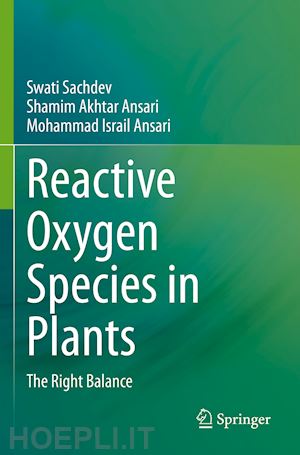
Questo prodotto usufruisce delle SPEDIZIONI GRATIS
selezionando l'opzione Corriere Veloce in fase di ordine.
Pagabile anche con Carta della cultura giovani e del merito, 18App Bonus Cultura e Carta del Docente
The book deals with dual role of reactive oxygen species (ROS) which is beneficial and harmful at below and above threshold limits, respectively. To date, the emphasis has been laid only on ROS aspects damaging/ disrupting cellular machinery and inflicting crop productivity loss. The ROS is believed to be a hallmark of both abiotic and biotic stress. However, the recent researches have unambiguously established that the ROS at below threshold confers protection against both abiotic and biotic stress, augmenting crop productivity. This emphasizes for a proper understanding of ROS based physio-molecular mechanisms and their upgradation in crops to adapt them to stress conditions. As a result, the cultivation area of various economically important crops and their productivity and quality can be enhanced, arresting degradation of sites, improving environment quality and mitigating ill impact of climate change. The book encompasses recent information on positive and negative impactof ROS on stress tolerance mechanisms and their management in augmenting crop performance. The information has been well illustrated and categorized in several chapters crafted lucidly, maintaining connectivity and synergy with each other. The book provides up-to-date comprehensive scientific information dual role of ROS, hitherto neglected, in crop abiotic and biotic stress management that would immensely benefit and educate graduate/ post graduate students, entrepreneurs, researchers, scientists and faculty members alike.
Dr. Swati Sachdev presently working as Assistant Professor at School of Liberal Arts and Science, Faculty of Science, Era University, Sarfarazganj, Lucknow-226003, India. She has completed her Ph.D. in Environmental Science from Babasaheb Bhimrao Ambedkar University, Lucknow, India in 2019. She has worked on (i) biological approaches for management of plant pathogens to reduce disease severity and improvement of plant productivity, (ii) toxicity assessment of industrial sludge, and (iii) monitoring of pesticides in food commodities at national level. Her main research area is sustainable agriculture. She has two years research experience at CSIR institutes and six months teaching experience at Rama University. She has published nine research articles and four book chapters. She has delivered oral and poster presentation in many national and international conferences. She was a gold medalist in M.Sc. (2010) and awarded University Grant Commission-Junior Research Fellowship in2013.
Dr. Shamim Akhtar Ansari, Scientist G & Ex-Director, Institute of Forest Productivity, Ranchi,India is an erudite academician and researcher with an experience of > 38 years. Dr. Ansari has specialized in Plant Physiology and Biochemistry during MS and doctoral work. Subsequently, he joined as Senior Scientist in Indian Council of Forestry Research and Education under Government of India Ministry of Environment, Forests and Climate Change. He has conducted extensive research, and developed expertise, in Clonal Forestry or Forest Biotechnology, including Tissue Culture and Adventitious Rhizogenesis and Population (molecular) Genetics and Association Mapping of Tropical Deciduous Trees. He served as Assistant Editor of "TFRI Newsletter" for five years (1997-2002) and Editor of peer reviewed international "Indian Journal of Tropical Biodiversity" for ten years (2002-2012). He has edited two books and published >100 research papers/ review articles/ popularscience articles and received global citations. He has also guided eleven students for doctorate program. Dr. Ansari has received several academic accolades; notable among them are University Gold Medal (Aligarh Muslim University, Aligarh)and R.D. Asana Gold Medal (Indian Society for Plant Physiology, New Delhi). Dr. Ansari is an elected fellow of Indian Botanical Society, Indian Society for Plant Physiology and the Linnean Society of London.
Dr. Mohammad Israil Ansari, is Professor of Botany at Department of Botany, University of Lucknow, India. Before joining University of Lucknow, he was Professor at Amity Institute of Biotechnology, Amity University, Lucknow Campus, Lucknow (2007-2016). Dr. Ansari graduated and post-graduated from Department of Botany, Aligarh Muslim University, Aligarh, India and doctoral degree from Dr. Ram Manohar Lohia Avadh University, Faizabad, India. Dr. Ansari is a Academia Sinica Fellow from Government of Taiwan. He has more than27 years of research and 16 years of teaching experience with more than 75 research papers, several books, book chapter, review articles, Ph.D., post-graduate summer projects as well as funded research projects to his credit. Dr. Ansari has been associated with Institute of Botany, Academia Sinica, Taiwan, Graduate Institute of Plant Biology, National Taiwan University, Taiwan and Institute of Plant and Microbial Biology, Academia Sinica, Taiwan (2000-2007). Dr. Ansari had made significant contributions in the field of Molecular Biology of Leaf Senescence, Dehydration Stress, Red Rot Disease of Sugarcane and Nanotechnology. Presently Dr.Ansari is working on GABA-Transaminase gene that play very important role in leaf senescence process and role of nanotechnology in plant stress conditions. Dr. Ansari is editorial board member of several international journals as well as member of several Academic Board/Faculty Board/Board of Studies/Research and Development bodies. Dr. Ansari has delivered several invited lectures at national and international level. Dr. Ansari has completed several funded projects from Department of Science and Technology, Govt. of India, New Delhi and Department of Biotechnology Govt. of India.











Il sito utilizza cookie ed altri strumenti di tracciamento che raccolgono informazioni dal dispositivo dell’utente. Oltre ai cookie tecnici ed analitici aggregati, strettamente necessari per il funzionamento di questo sito web, previo consenso dell’utente possono essere installati cookie di profilazione e marketing e cookie dei social media. Cliccando su “Accetto tutti i cookie” saranno attivate tutte le categorie di cookie. Per accettare solo deterninate categorie di cookie, cliccare invece su “Impostazioni cookie”. Chiudendo il banner o continuando a navigare saranno installati solo cookie tecnici. Per maggiori dettagli, consultare la Cookie Policy.